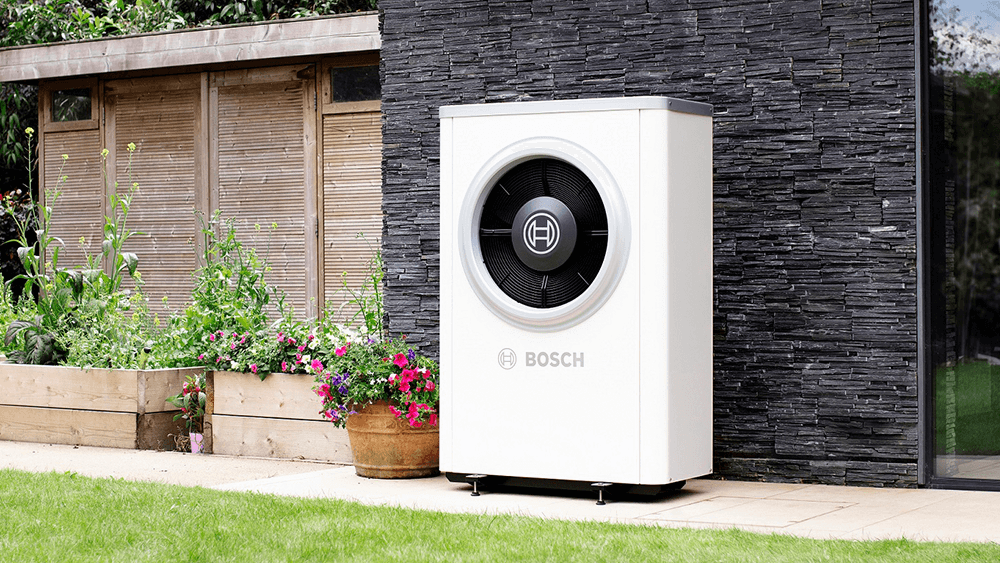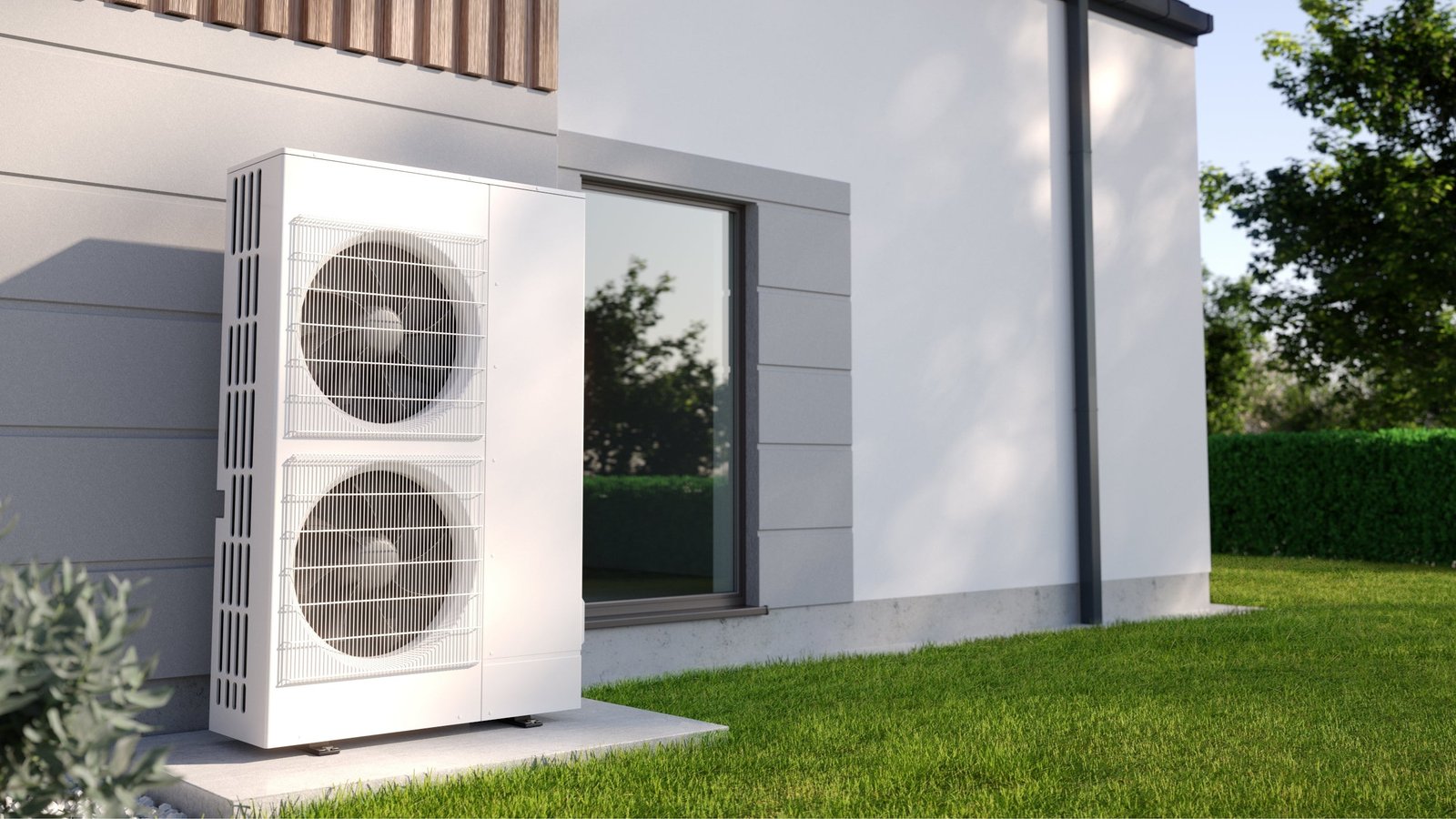Bookings Open
- Our online booking system provides real-time availability, allowing you to see which time slots are open and select the one that best fits your schedule.
- Once the booking is submitted, our team will connect you and assist with any further arrangements.
Quick Contact
Air-Source Heat Pump
Air source heat pump (ASHP), also known as an air-to-water heat pump, extracts heat from the outside air and transfers it to water. This heated water then warms your home through radiators or underfloor heating and can also be used to heat water stored in a cylinder for your taps, showers, and baths. ASHP are the most common type of domestic heat pump in the UK and are suitable for most types of home. They’re relatively small and cheaper to install than other types of heat pump. The heat pump is normally provided as a ‘monoblock’ that sits outside the home. The heat pump unit is around the size of two wheelie bins side by side.
Heat from the air is absorbed by a fluid, which then moves through a heat exchanger and into the heat pump. The heat pump increases the temperature of the fluid and transfers the heat to water.
Should You Consider an Air Source Heat Pump for Your Place?
Deciding whether an air source heat pump (ASHP) is a suitable choice for your home involves evaluating various factors. Here’s a comprehensive guide to help you determine if an ASHP is the right option for your heating and cooling needs.
ASHPs are energy-efficient systems that transfer heat between your home and the outside air. In winter, they extract heat from the outside air and move it indoors, while in summer, they reverse the process to cool your home.
Climate Compatibility
- Mild to Moderate Climates: ASHPs perform best in regions with mild to moderate temperatures. They can efficiently heat and cool homes in these climates year-round.
- Cold Climates: In areas with extremely cold winters, ASHPs might require a supplementary heating system to maintain comfort during peak cold periods.
Energy Efficiency
- Lower Energy Bills: ASHPs are known for their high efficiency, potentially reducing your energy bills compared to traditional heating and cooling systems.
- Environmental Impact: These pumps use electricity, which can be sourced from renewable energy, thus lowering your carbon footprint.
Installation and Space Requirements
- Outdoor Space: Ensure you have adequate space for the outdoor unit, which should be placed in a well-ventilated area.
- Indoor Space: Consider the indoor unit’s placement, which can affect your home’s aesthetics and layout.
Initial Costs and Incentives
- Upfront Investment: While the initial cost of purchasing and installing an ASHP can be higher than traditional systems, the long-term savings on energy bills can offset this.
- Financial Incentives: Check for available government rebates, tax credits, and other incentives that can reduce the overall cost.
Maintenance Requirements
- Regular Maintenance: ASHPs require periodic maintenance to ensure optimal performance. This includes cleaning filters, checking refrigerant levels, and inspecting the system for any issues.
- Longevity: With proper maintenance, ASHPs can last for 15-20 years, making them a durable choice for home heating and cooling.
Performance and Comfort
- Consistent Temperature: ASHPs provide consistent heating and cooling, contributing to a comfortable indoor environment.
- Noise Levels: Modern ASHPs are designed to operate quietly, though the outdoor unit may produce some noise.

What type of air source heat pump should I choose?
When considering whether a heat pump is right for you, several key factors should be evaluated. Taking these factors into account will help you make an informed decision about whether a heat pump is a suitable choice for your home.
Have any ideas in your mind?
Don't Hesitate to Reach Out!
How much does an air source heat pump cost to install?
The cost of an air source heat pump installation varies depending on:
- the size of heat pump.
- the size of the property.
- whether it’s a newbuild or an existing property.
- whether you need to change the way you distribute heat around your property.
The typical cost of installing an air source heat pump is around £14,000.
How much does an air source heat pump cost to run and will it save me money on energy bills?
Running costs depend on how your heat pump is designed and how it’s operated. Savings on your energy bill also depend on the system you’re replacing.
Heat pump running costs can vary depending on:
- Whether your radiators are appropriately sized.
- Your electricity tariff.
- How the heat pump is controlled.
For more information, head to our in-depth guide to find out how to get the most out of your heat pump and maximise your savings.
Here are the potential annual savings of installing a standard air source heat pump, including any recommended radiator upgrades, in an average sized, three-bedroom semi-detached home.
How do I get an air source heat pump?
Hopefully our guide has given you a clear idea of whether an air source heat pump is right for you. If it is, then you need to decide on a heat pump system with the help of trusted installers.
It’s important to check if you need to apply to your local planning authority for permission. Most heat pump installations are considered ‘permitted developments’, meaning no permission is needed.
However, there are exceptions, and it’s best to check with your local planning department before proceeding. This is especially important if you live in a listed building or conservation area.




